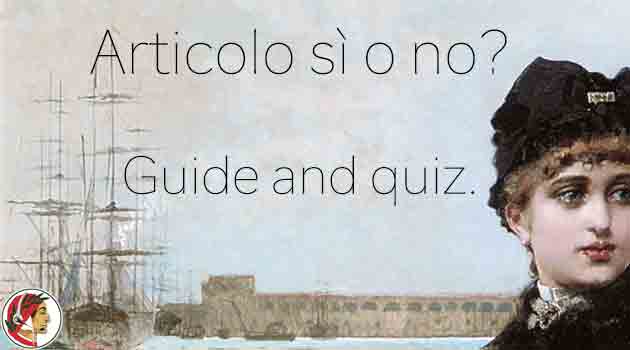Learn the cases when we don’t need to put the article in Italian.
You probably came across a sentence like:
- il mio amico è simpatico.
And then you learned that:
ilMio fratello è simpatico.
So, the rule says that we have to omit the article before mio, tuo, suo, nostro, vostro fratello, or any family member (singular), but not before il loro fratello, la loro sorella and so on. Loro (their) is different, we need the article.
On top of that, we always need to put it before the plural i miei, i tuoi, i suoi, i nostri, i vostri, i loro fratelli le loro sorelle etcetera.
When we use diminutives, we can say Il nostro fratellino, La mia nonnina.
Another strange one without articles is in cases like:
- sono… affari miei, problemi tuoi, amici nostri, cavoli vostri…
Geography
Names of cities and small islands do not have an article.
- Venezia, Milano, Firenze, Capri… There are exceptions, such as L’Aquila, La Spezia, l’Elba.
We put an article if we describe a particular aspect of a city (called attributo in grammar).
- La Venezia dei Dogi, La Milano da bere, La Firenze dei Medici and so on.
Mountains and rivers do have the article.
- Il Monte Bianco, l’Everest, il Gran Sasso, le Alpi, le Ande, il Po, il Tevere, l’Arno.
Big Islands generally have an article.
- La Sicilia, la Sardegna, il Madagascar… ma Cipro, Taiwan, Cuba.
Regions and nations have articles.
- La Toscana, l’Umbria, la Lombardia, il Veneto, le Marche and la Francia, la Russia, l’Australia, il Canada, l’Inghilterra, gli Stati Uniti.
If you didn’t do that yet, go and vote for your favourite Italian region on our Forum.
Names
Names of people don’t like articles. Fabio, Marco, Andrea, Laura, Valeria etc have no article.
However, I’m from Milan and authentic milanesi say “Ho telefonato al Gianni” or ” Mi piace la Lucia”, but this is regional Italian.
In very formal Italian language, written and spoken in tribunals, in history or literature books, last names may have an article, when a particular person is or was unique. So, you can find:
- il Petrarca, l’Ariosto, il Tintoretto, il Mantegna… but also Dante, Garibaldi, Mazzini, Putin, Trump (no, we don’t say “il Donald”). without the article.
It seems that some artists go with the articles, politicians don’t.
Particular cases
No articles:
When some expressions are uses as adverb:
- di fretta, di proposito, a stento, di solito ….
- con calma, con pazienza, con odio, con sicurezza …
With some “motion to place” or location.
- vado in ufficio, torno a casa, lavoro in campagna, vengo in chiesa …
With verbs and nouns usually going together.
- ho fame, abbiamo sete, sento caldo, prova dolore, prendi tempo, fai pena…
With “da” to explain the function of an object.
- il coltello da cucina, le carte da gioco, il tavolo da giardino, le scarpe da ginnastica…
On billboards and signs.
- arrivi, partenze, tabaccheria, divieto di sosta, parcheggio riservato, fine.
I’m sure I forgot some.
Alla prossima.
LOADING QUIZ...
Painting: Vittorio Matteo Corcos: Una donna elegante a St. Malo (1933)

